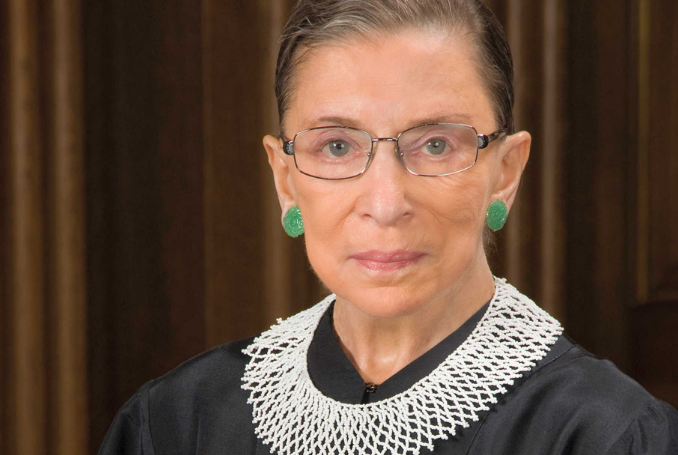
By Benay Blend
“The feed is wild right now and the record – on police violence, criminal justice, racism, and Indigenous sovereignty – does not justify the adoration. At all,” wrote Onyesonwu Chatoyer, organizer for the All African People’s Revolutionary Party. Upon hearing about the death of Supreme Court Justice Ruth Bader Ginsburg, Chatoyer expressed the skepticism that many felt about the concomitant outpouring of praise for a “notorious” rebel who in her later career did not live up to her moniker.
Four years ago David Kinder pondered an “explosion of pop culture affection” for “Notorious RGB,” the name a takeoff on “Notorious Big,” a world-famous rapper. “This incessant lionizing can border on the embarrassing,” Kinder concluded then, “even in its most lighthearted and transparent form”
Now that she is gone, and her iconization has reached fever pitch, this phenomenon can also open a window into the ways that the desire to turn reality into myth obscures the way that justice really works.
Origin myths are a part of any nation. In America, the righteousness of the Founding Fathers, the inevitability of Manifest Destiny, the notion of American Exceptionalism—all fall under the category of creation stories. All are designed to promote patriotism by providing a comfort level to the white majority who do not want to see how their actions have excluded at best, harmed at worst, anyone outside of the mainstream.
RBG was a product of second-wave feminism. As such, her concerns were reproductive rights, equal employment, and other worthy goals, but she seldom included the needs Indigenous women (in this country or in Palestine) or women of color in her decisions.
Part of the problem was that for second-wave feminists, there was not yet the concept of “feminisms,” the reality that women pursue many kinds of struggles for equality, depending on historical context and culture. Moreover, there was no effort to go beyond gender to look at the way that groups, too, are Othered, marginalized in order to leave space at the center for white women who set the standard.
“Not so much intersectionality of identities,” writes the activist Angela Davis, but the intersectionality of struggles is what she considers important (Freedom is a Constant Struggle: Ferguson, Palestine, and the Foundations of a Movement, 2016, p. 144). “One can’t really be a true revolutionary,” Davis charges, without understanding the need to join up with worldwide forces battling against imperialism (If They Come in the Morning…Voices of Resistance, 2016, p. 190).
Davis understood what RBG did not, that feminism extends beyond the concerns of middle-class women to include the concerns of groups as well as individuals. Moreover, “Progressive except Palestine” (PEP) was a position that Davis rejected after traveling to Palestine in 2011 (From Ferguson to Palestine 42). This was a position beyond RBG’s understanding.
“I just can’t jump on this wagon,” wrote the Palestinian author Susan Abulhawa. “It’s okay to appreciate all she[RBG] has done for women and LGBTQ communities,” she continued, but “it’s important not to whitewash the harm she has done, too.” Here Abulhawa is referring to RBG’s acceptance of a Lifetime Achievement Award in 2018 at a ceremony held in Tel Aviv’s Yitzhak Rabin Center. Upon accepting the award, she said: “The demand for justice, for peace, for enlightenment, runs through the entirety of Jewish history and tradition,” thus glossing over the Occupation.
In turn, she donated part of the money to a network of bilingual Hebrew and Arabic schools in Israel operated by Hand in Hand, an institution that practices what Haidar Eid terms “normalization” of the Occupation. “Normalizing oppression has always been one of the tools used by the colonizer against the resistance of the oppressed and colonized,” Eid maintains, and he defines it as
“the participation in any project, initiative or activity, in Palestine or internationally, that aims (implicitly or explicitly) to bring together Palestinians (and/or Arabs) and Israelis (people or institutions) without placing as its goal resistance to and exposure of the Israeli occupation and all forms of discrimination and oppression against the Palestinian people.”
A liberal Zionist, RBG chose to ignore the rights of Palestinian people. She also slighted Indigenous rights in this country in several cases. For example, there is the 2005 opinion that she wrote for Sherrill v. Oneida Indian Nation. In this instance, the town had begun foreclosure proceedings after the tribe, exercising their sovereignty rights, refused to pay taxes to the city. Writing for the 8-1 decision, she said:
“Given the longstanding non-Indian character of the area and its inhabitants, the regulatory authority constantly exercised by New York State and its counties and towns, and the Oneidas’ long delay in seeking judicial relief against parties other than the United States, we hold that the tribe cannot unilaterally revive its ancient sovereignty, in whole or in part, over the parcels at issue.”
In her decision, RBG was making use of the doctrine of Christine discovery and domination that allowed Columbus to claim various Indigenous lands. In doing so, writes Stephen Newcomb: “She was citing to a racist and religiously bigoted doctrine that dominates our nations and dehumanizes our peoples on the basis of the Bible and Christianity.”
Moreover, continues Newcomb, there is a connection between the “Old Testament Chosen People-Promised Land Narrative,” and thus Ginsburg’s choice of a racist doctrine was no coincidence. Used in both Israel and the United States to justify the appropriation of indigenous land, this reasoning excuses land theft based on an outdated colonial doctrine.
In the assessment of historian Michael Leroy Oberg, RGB has written some “helpful and valuable decisions,” but in the area of Indigenous land claims, the Supreme Court itself is not a “promising arena.” In this case, he continues, the Justice seemed to be saying that history is determined by the victors, and so for Native people her decision meant “you are out of luck.”
More recently, she voted in a 7-2 margin to allow the Atlantic Coast Pipeline to pass underneath Indigenous Appalachian territory, a decision that could result in cultural and ecological genocide. The pipeline will intersect the ancestral land of the Lumbee Tribe, who are closely connected to the land.
“The land isn’t just what you plant on. It’s where the trees are located. It’s where the water is filtered through the land and then goes into the river,” community activist Donna Chavis explained. “So you’re looking at every aspect of our historical, cultural ways being threatened by the pipeline. And the pipe, when it goes in, it’s forever.”
In a 2005 interview, the late historian Howard Zinn explained:
“It would be naive to depend on the Supreme Court to defend the rights of poor people, women, people of color, dissenters of all kinds. Those rights only come alive when citizens organize, protest, demonstrate, strike, boycott, rebel, and violate the law in order to uphold justice.”
Zinn does not suggest that we should “ignore the courts or the electoral campaigns. It can be useful to get one person rather than another on the Supreme Court, or in the Presidency, or in Congress. The courts, win or lose, can be used to dramatize issues.”
No Supreme Court will demand justice, he includes, but rather “fundamental change” depends on the “actions of an aroused citizenry” demanding the fulfillment of human rights. In a world in which our rights are connected to those of others on an international stage, its also important to heed the words of Angela Davis, who worked to place Palestine at the center of social movements. Where Zinn promoted the power of grassroots movements, Davis connected the dots to include Palestine in those crusades.
In RBG’s decisions, there are clear connections to her views on settler-colonial states, both here and in Occupied Palestine. In her acceptance of the aforementioned award, and in her decisions on Indigenous sovereignty, she recalled the Doctrine of Discovery to reward what she considered the winner of the spoils. No matter who is elected, who takes her place on the Court, it would be wise to remember the words of Howard Zinn:
“The courts have never been on the side of justice, only moving a few degrees one way or the other, unless pushed by the people. Those words engraved in the marble of the Supreme Court, ‘Equal Justice Before the Law,’ have always been a sham.”
– Benay Blend earned her doctorate in American Studies from the University of New Mexico. Her scholarly works include Douglas Vakoch and Sam Mickey, Eds. (2017), “’Neither Homeland Nor Exile are Words’: ‘Situated Knowledge’ in the Works of Palestinian and Native American Writers”. She contributed this article to The Palestine Chronicle.

– Benay Blend earned her doctorate in American Studies from the University of New Mexico. Her scholarly works include Douglas Vakoch and Sam Mickey, Eds. (2017), “’Neither Homeland Nor Exile are Words’: ‘Situated Knowledge’ in the Works of Palestinian and Native American Writers”. She contributed this article to The Palestine Chronicle.







